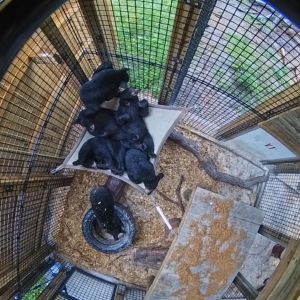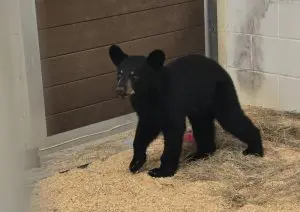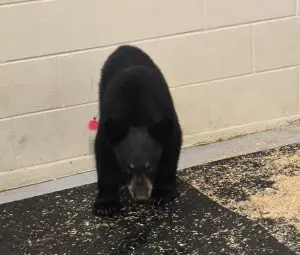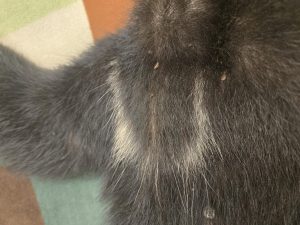

Several of our Florida black bear cub patients snuggle up in a bed at our Black Bear Rehabilitation Center, affectionately known as Brody Bear’s Rescue and Rehab.
Editor’s Note: The Florida Fish and Wildlife Conservation Commission’s (FWC) Bear Management Program works closely with Brevard Zoo and other partners to ensure orphaned black bear cubs not yet able to survive on their own are given the best chances at successful rehabilitation and eventual release back into their natural habitat. FWC Bear Management biologists are scheduling releases of rehabilitated bear cubs born this year to be done in January 2026, which is outside of Florida’s black bear hunting season set for December 2025. Additionally, rehabilitated bear cubs will be released into habitat that is not part of current established bear hunting zones. The FWC aims to release rehabilitated young bears on public conservation areas that have high quality bear habitat and low density of both bears and people to give them the best chances for survival.
Our Black Bear Rehabilitation Center is quickly filling up with cubs! Over the past few weeks, we’ve welcomed not three…not four…but five additional Florida black bear cubs to our behind-the-scenes center.
For those of you counting, that’s a whopping 12 bear cubs we’ve cared for since the Rehabilitation Center’s opening in May! Our Zoo’s role is to help cubs in need through rehabilitation and release, and we’re incredibly proud to care for such tough bears and support Florida’s native bear population as a whole. We’re grateful for the opportunity to give these cubs a second chance!
Here are the stories of this latest set of cubs:
The moment yearling cub Jon Bear arrived at our Zoo, it was clear he needed our help. This cub was emaciated, anemic and missing patches of his fur, being one of the most tragic cases we’ve taken in so far. The yearling cub’s body was also laden with ticks and internal parasites.
Cases like these break our hearts to see, but we’re fortunate to be in a position to help. We’re happy to share that Jon Bear has been one tough cookie, and with plenty of treatment, antibiotics and rest, he’s already up 5 pounds in a couple short weeks. For now, he will remain at our L3 Harris Animal Care Center as he heals.
Next up are Larry, Mo and Curly, three 7-month-old siblings. This playful bunch of male cubs were named after the comedy group, The Three Stooges!

The three cubs can be identified by their similar blonde markings around their eyebrows and snouts. This is Mo!
Sadly, the cubs’ mom was struck by a car, one of the leading causes of Florida black bear deaths. We urge drivers to always drive safely, particularly at night, and keep a watchful eye out for nearby wildlife to prevent stranded cub cases like this from happening.
Luckily, the trio were in healthy condition and were quickly medically cleared to live with our six current bear patients: Rickie, Morty, Frosty, Fern, Branch and Berry.
At our Rehab Center, we equip our bear cub patients with foraging, climbing and problem-solving opportunities to steer our cubs down the right path of bear development. Now, Curly, Larry and Mo are well on their way to learn “how to be a bear!”

Meet Curly!
Last but certainly not least is Blaze, a 7-month-old male cub who was on his own when he was found. This little one was named after the marking on his chest.

With so many cubs scurrying around our Center, we’ll take any identifying markings we can get!
Blaze came in at a healthy weight and is generally in decent condition. We did find parasites inside this little bud’s body, but they were quickly treated and removed. Since he’s all better, he’s also joined the rest of the cubs in our Rehab Center!
We are continually proud to lend a paw and save our Florida black bear friends in need, one cub at a time.
Check back with our blog and social media accounts for more updates on our many, many cubs!
We would like to thank the following generous donors for supporting our mission-based programs:
Flammio Financial Group · Stifel- Garvin Wealth Management Group · Artemis IT · Pepsi Bottling Company · Amazon · PCL Construction | Nassal | MEC | Heard
Contact FWC’s Wildlife Alert Hotline at 888-404-FWCC (3922) if you have found a sick, orphaned, injured or dead Florida black bear. You can also leave feedback for FWC commissioners regarding FWC’s Bear Management Plan here.